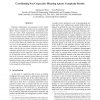Free Online Productivity Tools
i2Speak
i2Symbol
i2OCR
iTex2Img
iWeb2Print
iWeb2Shot
i2Type
iPdf2Split
iPdf2Merge
i2Bopomofo
i2Arabic
i2Style
i2Image
i2PDF
iLatex2Rtf
Sci2ools
IAT
2005
IEEE
2005
IEEE
Coordinating Non Cooperative Planning Agents: Complexity Results
Whenever independent, non-cooperative actors jointly have to solve a complex task, they need to coordinate their efforts. Typical examples of such task coordination problems are supply chain management, multi-modal transportation and patient-centered health care management. Common elements in such problems are a complex task, i.e., a set of interdependent subtasks, and a set of competitive actors. Solving a task coordination problem first of all requires to solve a task allocation problem (how to assign competitive actors to the subtasks). As a result, each of the actors will receive a set of subtasks to complete and will need to make a plan for this set of tasks. Therefore, also a plan coordination problem has to be solved (how to ensure that a joint plan always can be composed, whatever plan is chosen by the individual actors). The aim of this paper is twofold: first of all to present a general formal framework to study some computational aspects of this non-cooperative coordinati...
| Added | 24 Jun 2010 |
| Updated | 24 Jun 2010 |
| Type | Conference |
| Year | 2005 |
| Where | IAT |
| Authors | Adriaan ter Mors, Cees Witteveen |
Comments (0)

